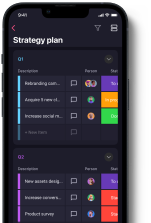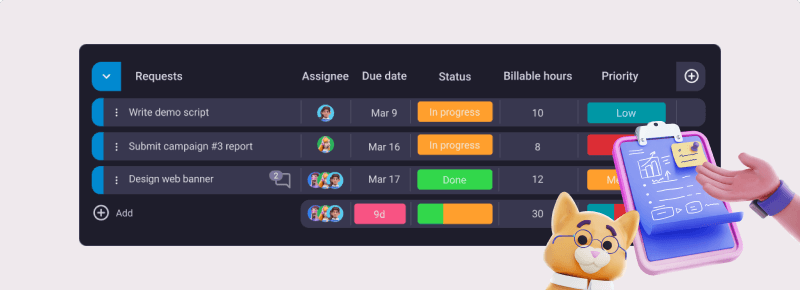Not sure what the differences between program management and project management are? Don’t worry — you’re not the only one.
Read on for a comparison of program management vs project management to finally learn how to distinguish between them.

- Program management involves managing multiple related projects at the same time, whereas project management entails managing an individual project.
- Programs focus on the outcome and achieving specific business objectives. In contrast, projects focus on output and achieving project-specific deliverables.
- Programs are long-running and sometimes even permanent, while projects are short-term endeavors with an agreed-on end date.
- A program manager’s job is more strategic and involves extensive management of all projects within a program.
- A project manager’s job is more technical and limited to individual projects.
Table of Contents
What is program management vs project management?
Program management is the simultaneous management of multiple dependent projects, while project management is the management of an individual project.
Program management entails coordinating a large group of related projects (a program) and regular everyday operations so that they contribute toward an organization’s strategic goals. The goal of every program is to reach a specific business objective.
An example of a program would be a SaaS company trying to make their products SOC 2 compliant. To do that, the company has to coordinate all ongoing projects as well as make some changes to regular day-to-day procedures.
To compare, project management involves applying specific skills, processes, methods, tools, and knowledge to achieve the objectives of an individual project. The goal of every project is a project deliverable.
An example of a project would be a company looking to create a brand-new website. The final deliverable, in that case, is the finished website.
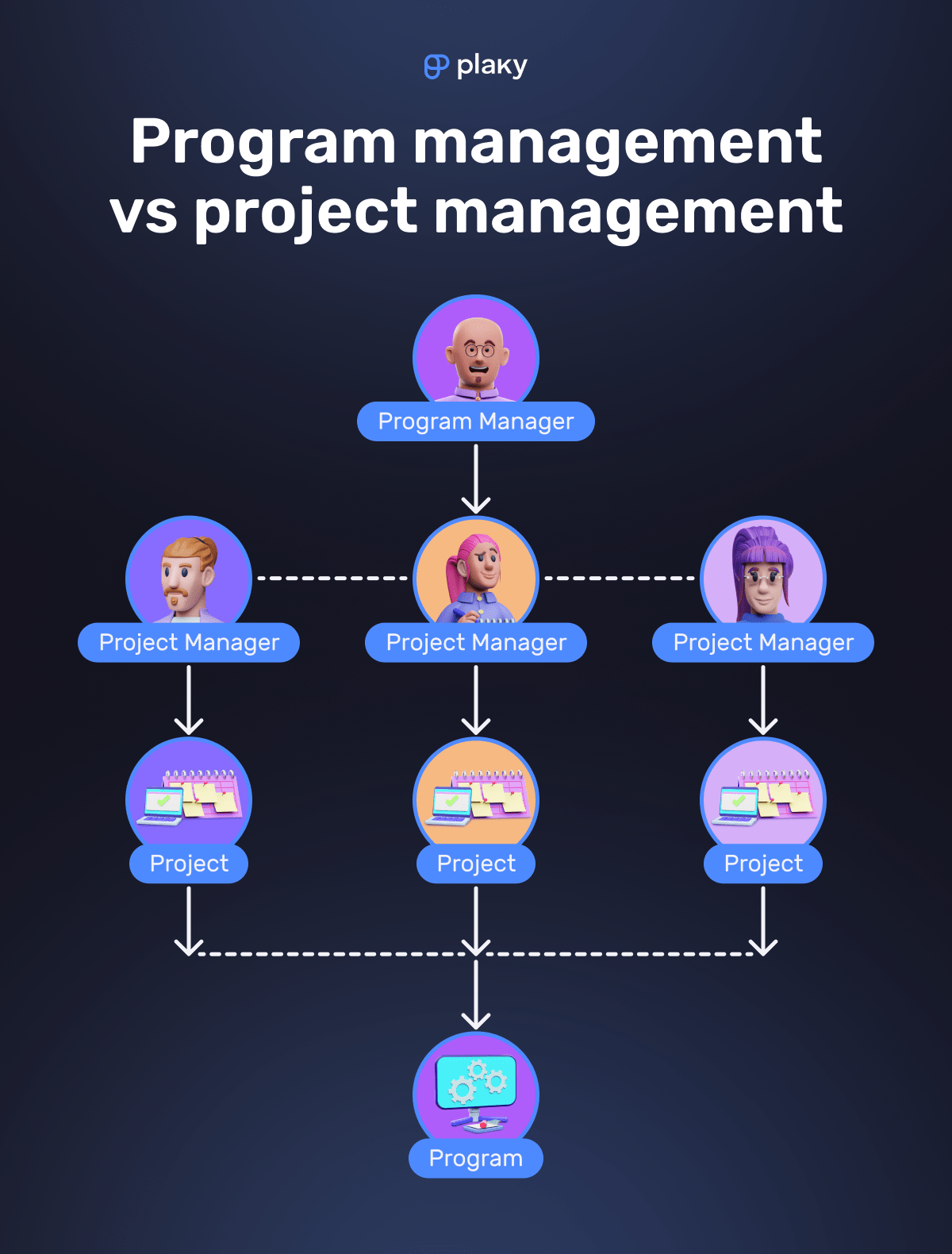
💡 Plaky Pro Tip
For a detailed look as to why project management is important, read this guide:
Why are program management and project management often confused?
One of our contributors, Dmitry Kulaksyz, a PMP-certified project manager and COO at Stripo Inc, shared why he thinks program and project management are often mixed up:

“This confusion might stem from the similar methods and tools used during the implementation stages of projects.”
Another expert, Craig Guarraci, an experienced project and program management professional and the founder of Tech PM Career Path, LLC, believes the confusion is caused by the pervading assumption that projects and programs are one and the same, despite their differences:

“A project has a specific start and end date and project goals, thus a project exists for a particular span of time. A program is an ongoing effort such as a ‘cost reduction program’ or a ‘customer success program’ which may not have an end date or may take years to accomplish.”
A few famous programs have been misnamed as projects, e.g., the Manhattan Project.
According to Patrick Weaver, author of Understanding Programs and Projects — Oh, There’s a Difference!, the Manhattan Project was a program by all modern definitions, requiring:
- The construction and operation of several factories, and
- The development and creation of 2 types of atomic bombs.
Managing this type of workload goes way above the scope of any individual project. But everyone called it a project — so the name stuck.
That said, projects can also be larger endeavors.
For example, the Chunnel Project was indeed a project because even though it was extremely complex and ambitious, it had a defined final deliverable — the underground channel — as well as a set project budget and timeline.
💡 Plaky Pro Tip
Using the right project management software is essential to project success. Find the best software for your next project in the lists below:
What is the difference between project management and program management?
The main difference between program management and project management is that program management is a long-running process focused on multiple connected projects with a shared goal, whereas project management is a finite process focused on individual projects.
Here’s a short overview of the most important differences between these 2 concepts.
| Project management | Program management |
|---|---|
| Focused on output and creating deliverables | Focused on outcome and achieving strategic long-term goals |
| Has a defined scope | Has a fluid (amorphous) scope |
| Has a limited budget | Doesn’t have a limited budget |
| Has a set deadline and requires a detailed schedule | Has a flexible timeline and interfaces between multiple projects using their schedules |
| Deals with technical tasks | Deals with strategic tasks |
| Success defined by finishing the project on time and within the project’s budget and scope | Success defined by delivering value |
| Limited stakeholder interaction | Complex stakeholder interaction |
| Avoids change | Embraces change |
| Aims to minimize project-related risks | Takes into account all risks associated with the whole program |
| Seeks certainty | Expects ambiguity |
Now let’s go into more detail about these differences.
Difference #1: Focus
One of our contributors, Dmitry Kulaksyz, explained what the main goals of program and project management are:

“A project’s goal is to deliver specific outcomes within set timeframes, budgets, and quality targets. However, program management looks at the bigger picture, focusing not just on successfully completing individual projects but ensuring all these projects collectively contribute to the organization’s strategic goals.”
Difference #2: Scope
Dmitry Kulaksyz also explained to us how program and project scopes differ:

“Project management is concerned with individual projects, each with a clearly defined scope and specific outcomes. On the other hand, program management oversees a portfolio of related projects, where its scope is broader, encompassing the coordination of multiple projects to achieve a strategic business goal.”
Since a program aims to deliver common business value, its scope is also more amorphous than a project’s scope. Instead of being locked down at the beginning, it evolves over time.
Difference #3: Budget
As projects are subsets of programs, their budgets are limited and derived from a shared program budget.
Programs, however, typically operate without strict budgetary constraints and are more flexible overall.
Difference #4: Timeline
Projects have specific project timelines and set deadlines to adhere to, whereas programs have more flexible timelines to ensure their goals are always in line with the business’ best interests.
Scheduling-wise, project managers are the ones who coordinate and schedule project tasks and activities to encompass 100% of the work.
In turn, program managers oversee and coordinate multiple projects at a time, as well as interface between projects and their schedules, managing any gaps along the way.
Difference #5: Tasks and activities
Most of the project management work is technical, while program management focuses on strategy and performance. As Dmitry Kulaksyz puts it:

“While project managers focus on the day-to-day operations of their projects, program managers monitor the overall performance of the program. They keep track of each project’s progress and its contribution to achieving the program’s objectives, intervening when necessary to offer assistance or make corrections.”
Dmitry also explained that program and project managers nurture different approaches to their work:

“The project manager’s role is more tactical and detail-oriented, focusing on specific tasks and short-term goals aimed at the successful completion of the project. On the other hand, the program manager plays a strategic role, focusing on long-term business goals while ensuring the program aligns with the organization’s objectives. They engage in higher-level planning and decision-making.”
According to Molly Beran, PMP-certified president and founder of Projects By Molly, LLC, the difference in the type of work program and project managers do may depend on the organization’s size:
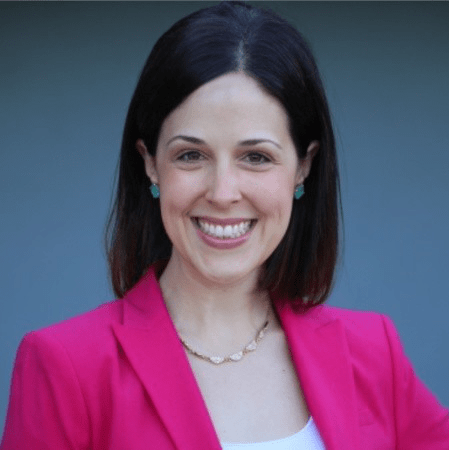
“For some organizations, especially very large, multinational corporations, there might be a big difference in the work project managers do vs. program managers, especially in terms of what style of reporting and tracking is being done and at what levels of the organization a project or program manager is reporting into.”
💡 Plaky Pro Tip
Before starting any work, project managers have to choose a project management methodology that aligns with their needs and goals. Here’s an overview of the 20 most commonly used methodologies today:
Difference #6: Definition of success
Generally speaking, a successful project is one that has been finished on time and within the project’s established budget and scope.
But as programs don’t have defined timelines, scopes, or budgets, their success is reflected in the business value they bring to the organization.
Difference #7: Stakeholder interaction
As explained by Craig Guarraci, a project manager’s stakeholder management role is limited to engaging a defined set of project stakeholders:

“A program manager multitasks across several related projects within a single program and works with many different stakeholders, which could vary across each project. In contrast, a project manager usually manages one project at a time and usually has a fixed set of project stakeholders.”
Difference #8: Attitude toward change
Since a program’s scope isn’t defined from the get-go, program managers embrace change as inevitable and adjust their strategies accordingly to keep delivering business value.
However, projects try to steer clear from change to prevent it from jeopardizing the final results.
Difference #9: Risk management
According to Dmitry Kulaksyz, program and project managers don’t deal with the same types of risks:

“While both roles involve managing risks and changes, they differ in scope. Project managers address risks and changes within projects. However, program managers deal with any risks and changes that could impact the entire program, requiring a more comprehensive approach.”
💡 Plaky Pro Tip
One of the ways to keep track of project risks is to use a project management tool like a RAID log. Learn how to create and use a RAID log in the guide below:
Difference #10: Attitude toward uncertainty
Due to careful planning and pre-set expectations, projects aren’t ambiguous.
In contrast, programs expect a certain level of uncertainty that they then work through to define what needs to be done and which benefits or opportunities can be maximized.
Program manager vs project manager activities
According to Molly Beran, program and project managers usually have a similar skillset:

“Honestly, if you’ve got a lot of talent as a project manager, I think it’s highly applicable to being a program manager. Both require leadership, communication skills, an attention to detail, and an unwavering commitment to accountability.
What’s different will vary by organization, but it’s often the level of organizational leadership a person has. Program managers would tend to be higher-level leaders than project managers (but not always).”
Let’s see how the roles of project managers and program managers differ based on their responsibilities.
What does a program manager do?
According to Western Governors University’s Program Manager Career Guide, a program manager’s day-to-day tasks include:
- Planning and monitoring program execution,
- Project coordination and managing project interdependencies,
- Creating and managing a budget,
- Cross-project resource management,
- Identifying and addressing problems and risks,
- Program documentation,
- Stakeholder communication, negotiation, and problem-solving, and
- Aligning or realigning deliverables with program outcomes.
What does a project manager do?
As PMs move through the project phases, they can expect to have a number of project manager responsibilities, such as:
- Defining scope,
- Planning and organizing tasks, including creating a comprehensive project plan,
- Managing project resources,
- Negotiating with contractors and suppliers,
- Assessing and managing risks,
- Communicating with project team members and other stakeholders,
- Managing changes,
- Documenting progress,
- Collecting signatures,
- Motivating people, and
- Working on improving employee engagement.
Fun fact — while all project management skills are important, communication is the most used PM skill, accounting for 90% of what project managers do.
In fact, one of our experts, Dmitry Kulaksyz, emphasized how important communication between program and project managers is:

“Effective communication is crucial. There should be regular syncs between the organizational strategy and project teams. These sessions ensure a flow of information, keeping project managers informed about any changes in strategies, priorities, or resources that could impact their tasks.”
💡 Plaky Pro Tip
One of the key responsibilities of project managers is communicating with team members to enable effective collaboration. But how do you develop a strong project team? Find out in the guide below:
Try Plaky for efficient program management and project management
When managing projects, you need project management tools like Plaky that cover the needs of the project team and can easily:
- Handle task scheduling,
- Facilitate effective project collaboration, and
- Keep everyone up to date.
As versatile project management software, Plaky also serves as a centralized platform for program managers that provides insight into all the program’s projects and operations.
And since it’s scalable, even larger organizations can use Plaky to support their entire workforce, allowing program managers to easily keep track of all moving parts that comprise their programs.
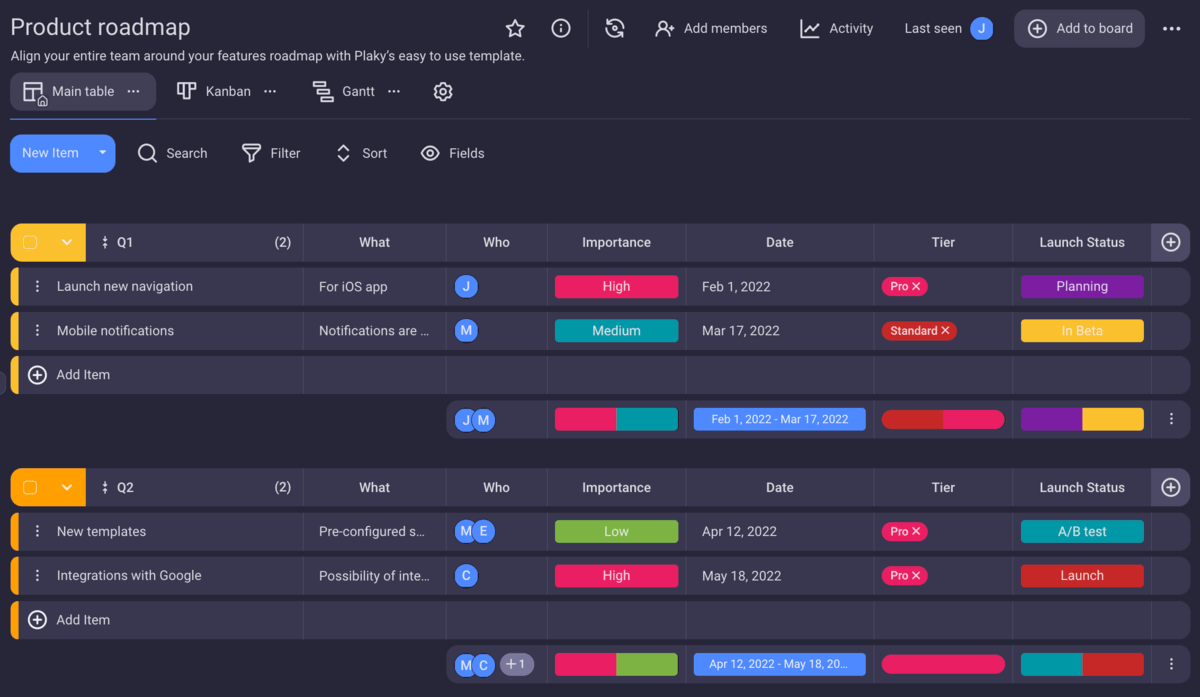
In Plaky, organizations can create a different space for each project within the program and either make their boards from scratch or use premade templates available for various types of projects.
With a number of customization options available, program managers can tailor-make each Plaky board to display crucial data about each project, its status, deadline, and more.
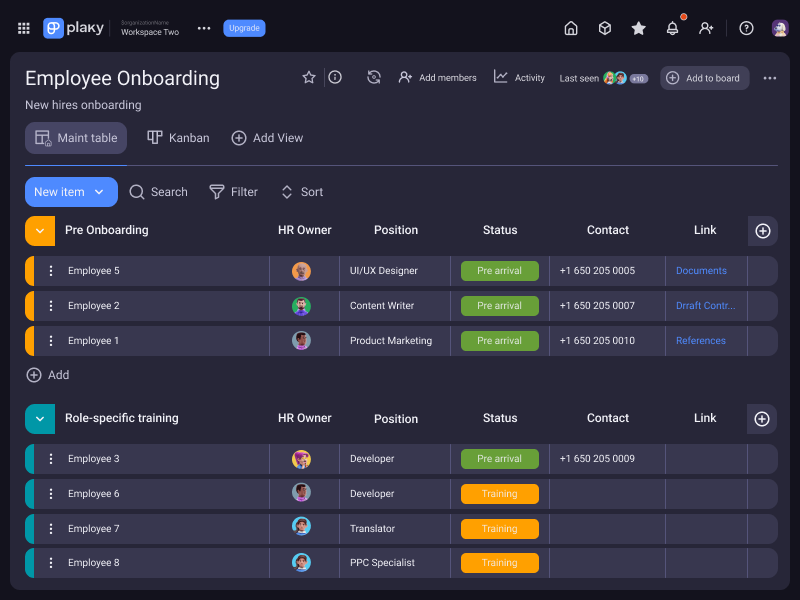
As for project managers and team leaders, they can use Plaky’s powerful and extensive task management features to streamline day-to-day operations.
Better yet, project teams can collaborate in real time in Plaky by:
- Sharing crucial project-related files and documents,
- Communicating directly in the comments sections, and
- Getting notifications about any updates and changes made to the task cards.
Project management software like Plaky can help keep project teams on the right track, as well as enable program managers to stay in control of their programs’ development and success. Sign up for a free Plaky account today.



